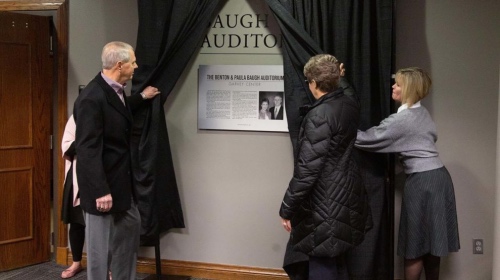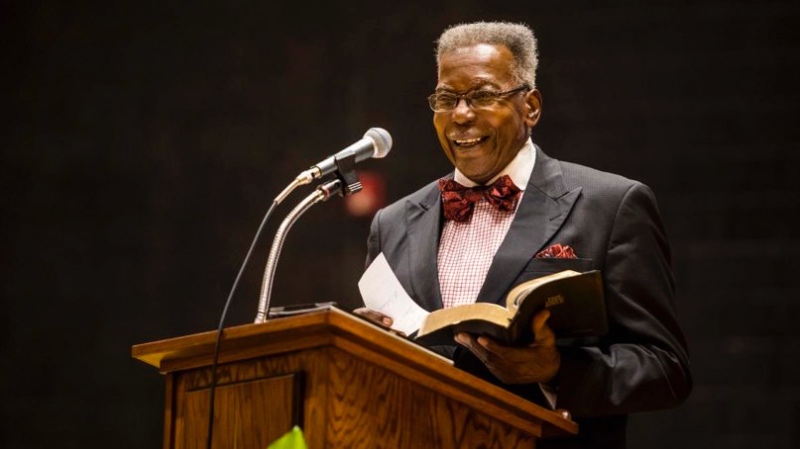Oklahoma City, US
RNS
A Christian university in Oklahoma is renaming its main auditorium – known for a half-century as Hardeman Auditorium – amid concerns over a racist statement attributed to the late namesake, NB Hardeman.
The president of Oklahoma Christian University, which is associated with Churches of Christ, recently revealed to students that the assembly hall’s new name will honor donors Benton and Paula Baugh.

Oklahoma Christian University President John deSteiguer reveals that the school assembly hall’s new name will honor donors Benton and Paula Baugh at the former Hardeman Auditorium in Oklahoma City on 26th February. PICTURE: Courtesy of Hayley Bentley, Oklahoma Christian University
The Baughs are members of the Memorial Church of Christ in Houston and active proponents of racial unity efforts in Texas’ largest city. They recently gave Oklahoma Christian $US1 million – just their latest donation after previous seven-figure support of the university’s Bible and engineering programs.
Students greeted President John deSteiguer’s announcement of the newly renamed Baugh Auditorium – already dubbed the “Baughditorium” – with a standing ovation.
“For a lot of African-American students, we’re happy that the name is changing,” said Elise Miller, a sophomore from Plano, Texas. “It’s difficult to worship under the context of a man who, if you met him, probably wouldn’t like you.”
In 1966, Oklahoma Christian dedicated the 1,175-seat auditorium in memory of the late NB Hardeman, whom the university’s website called “a great preacher among churches of Christ in the early part of the 20th century and a longtime president of Freed-Hardeman College”.
But recently, some students, faculty members and alumni raised questions about whether Hardeman was a racist.
“As I learned more and more about the levels of concern that people had, I thought: Hospitality and welcoming people are such important core values of this institution that we probably needed to make a change,” deSteiguer said.
Minority and international students comprise roughly one-third of Oklahoma Christian’s total enrollment of nearly 2,300.
In an article titled “Negro Meetings for White People” in the March 1941 edition of the Bible Banner, prominent Church of Christ preacher Foy Wallace wrote that Hardeman refused to meet with African-American Christians and made derogatory comments about them while speaking in Texas.
“When NB Hardeman held the valley-wide meeting at Harlingen, Texas, some misguided brethren brought a group of negroes up to the front to be introduced to and shake hands with him,” Wallace wrote. “Brother Hardeman told them publicly that he could see all of the colored brethren he cared to see on the outside after services, and that he could say everything to them that he wanted to say without the formality of shaking hands. I think he was right. He told of a prominent brother in the church who went wild over the negroes and showed them such social courtesies that one day one of the negroes asked him if he might marry his daughter. That gave the brother a jolt and he changed his attitude!”
Douglas A Foster, director of the Center for Restoration Studies at Abilene Christian University in Texas, said the statement attributed to Hardeman was “typical of the overtly racist attitudes of the day, including the reference to black men as sexual predators and the specter of miscegenation.”

Eugene Lawton, minister for the Newark, New Jersey, Church of Christ, preaches on liberation from injustice at the 83rd annual Bible Lectureship at Freed-Hardeman University in Henderson, Tennessee, on 5th February, 2019. PICTURE: Courtesy of Bramblett Group
“Hardeman, like virtually all the white leaders of our churches and schools, bought wholly into white supremacist ideology, and it was manifested throughout all his dealings with people,” Foster said.
Oklahoma Christian officials quietly removed the Hardeman name from the auditorium over the Christmas break, a fact first reported by the student newspaper The Talon in late January.
Brad Bradshaw, a great-grandson of Hardeman, responded that nothing in his great-grandfather’s life, actions or works “supports any kind of disunity in the church. On the contrary, he was in favor of unity.”
The great-grandson, who attends a Church of Christ in the Atlanta area, said older relatives who knew Hardeman well and are still living witnessed no hint of racial prejudice.
“The allegations that my great-grandfather was a racist are a complete lie,” said Bradshaw, who was nine-years-old when Hardeman died at age 91 in 1965. “It upset me, and it upset the family.”
Freed-Hardeman University in Henderson, Tenn., also is associated with Churches of Christ. It’s named after AG Freed and Hardeman. Officials there declined to comment on Oklahoma Christian’s decision to rename its auditorium.
However, Freed-Hardeman President David Shannon addressed racial issues at the Tennessee university’s recent 83rd annual Bible Lectureship. Shannon responded to a keynote sermon by a prominent African-American minister named Eugene Lawton. The New Jersey preacher’s message, taken from Exodus 22:21-27, addressed how “liberation from injustice was needed in Egypt then, and liberation from injustice is needed now in America,” according to the online program.
Shannon voiced regret for “so many injustices that we simply cannot explain.”
“We regret the violent times of the Civil War and civil rights [era] – times of prejudice and cruel hatred,” Shannon told the lectureship crowd. “I regret times that we settled to be nice yet to be separate.”
Shannon also said that “many of our Christian schools only opened the doors to all races when our government tied their funding – federal funding – to this discussion.”
“There’s no way to explain that away, to make it right,” he said. “It’s just not. For this I’m sorry.”
Churches of Christ have an estimated 1.4 million adherents in 12,000 congregations nationwide, according to a national directory.
In recent years, universities associated with Churches of Christ have taken steps aimed at racial reconciliation – from Lipscomb University in Nashville, Tennessee, awarding an honorary doctorate to Fred Gray, a civil rights attorney who once sued Lipscomb, to Abilene Christian launching a center on race studies and spiritual action.
At Oklahoma Christian, an annual “History Speaks” series brings civil rights icons such as Gray, former Atlanta Mayor Andrew Young and Terrence Roberts and Carlotta Walls LaNier of the Little Rock Nine to campus.
“It’s been a priority for us to bring in heroes who we could learn from and be with as we try to make this a more welcoming community for folks,” deSteiguer said.
Bobby Ross, Jr, writes for The Christian Chronicle, where the original version of this article appeared.






